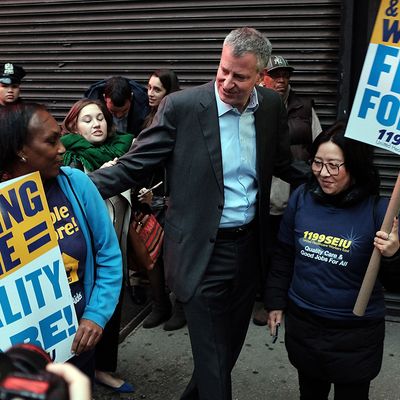
Today, the minimum wage in New York went from $8.75 to $9. Workers at fast-food chains will now make $9.75 an hour, and those in New York City will make $10.50. Tipped workers — like servers and bartenders — will see their hourly wages increase 50 percent and now make $7.50.
These changes are all part of the state’s slow creep toward a $15 minimum wage; by 2018, fast-food workers, who have been protesting for higher wages for years, should reach that goal in the city. All state workers in New York will also make $15 by 2018. A dozen states around the country legislated minimum-wage increases this week — policy changes that were greeted enthusiastically by workers, and begrudgingly by employers. (Two other states will see minimum wages rise because they are indexed to inflation changes.)
The federal minimum wage will remain at $7.25, where it’s been since 2009.
The minimum wage will go up by a dollar in Alaska on New Year’s Day. The state Labor Department thinks that means about 12,000 people in the state might get raises this week, according to the Seattle Times. In Michigan, the minimum wage will go up by 35 cents, which could mean that low-wage workers might start making about $728 more a year. South Dakota’s minimum wage, indexed to inflation, will go up by a nickel, and more than 280,000 people in Massachusetts will see their hourly wage rise to $10 — the highest statewide minimum wage in the nation, which will also become law in California tomorrow. Arkansas, Colorado, Connecticut, Hawaii, Nebraska, Rhode Island, Vermont, and West Virginia will also have higher minimum wages by the end of the week.
Although Governor Andrew Cuomo managed to give a $15 minimum wage to fast-food workers through executive means, giving the same benefits to all workers would require the cooperation of the Legislature. That will not be so easy. Ed Cox, chair of the New York Republican Party, told The Wall Street Journal, “It would be a disaster, particularly for upstate New York. This is all driven by Cuomo’s personal ambitions and politics, not by policy.” Many other people in his party agree — not just in New York, but across the country. (The fact that Republicans control Congress right now is a big factor in why the federal minimum wage hasn’t changed in so long.)
Restaurant owners in the city are also freaking out and have been begging Cuomo to freeze the increase for five years. Many expect that their prices will rise after the minimum-wage increase. A few places have already gotten rid of tipping and have added other charges to dining tabs as a way to deal with the increase. Amanda Cohen, the chef who runs Dirt Candy, told the New York Times last February, “I can’t imagine it won’t change the way restaurants operate. They’re going to have to raise their prices or go to a new tipping model. My guess is that restaurants are going to have to raise their prices and be honest about it and say this is what it costs to operate this business.”
The complaints don’t appear to have changed Cuomo’s mind. He told union leaders back in February that area businesses had been doing well. “When they sit down with the leaders of business, business can’t say ‘I’m sorry, I’m broke.’ They’re doing great. And we know they’re doing great. And we want them to do what’s fair, and we want them to do what is right by labor, and that is today is all about.” Supporters of the minimum-wage increase say that most of the raises are offset by price increases that don’t decimate a business’s ability to run — and that the economy is stimulated by encouraging people who were struggling to afford basic necessities to spend more.
Next year, it looks like a few more states might start raising minimum wages, too. USA Today notes that at least five states and nine cities are considering legislation or will vote on ballot measures pertaining to the minimum wage. The issue is also being discussed at the national level, both in the presidential race and in Congress, where Democrats have been pushing minimum-wage bills for quite some time.
In the Democratic presidential contest, Senator Bernie Sanders and Martin O’Malley have announced support for a $15 federal minimum wage — a policy that seems unlikely to be enacted anywhere in the near future, especially given the opposition to a statewide measure that would raise wages to $9 or $10. Hillary Clinton supports a $12 federal minimum wage.
In recent debates, Republican candidates have echoed most of their party colleagues in Congress, saying that raising the minimum wage at all would be a “disaster,” as Senator Marco Rubio put it, adding, “If you raise the minimum wage you’re going to make people more expensive than a machine.” Donald Trump added, “There is nothing that we do now to win. We don’t win anymore. Our taxes are too high … taxes too high, wages too high, we’re not going to be able to compete against the world. I hate to say it, but we have to leave it the way it is.” Ohio governor John Kasich disagreed, saying that sometimes “people need help.”
Earlier this week, New York mayor Bill de Blasio mentioned wages as something he plans to focus on next year during a radio interview, per Politico New York. “The focus has always been on trying to raise the wages and benefits of New Yorkers — that’s one of the examples we’ve talked about before — paid parental leave, improving the benefits that people have that really change their lives and make their lives more livable,” he told WOR710 AM. “We’re going to obviously fight for higher wages — that’s something that Albany has to approve, a higher minimum wage.”





























